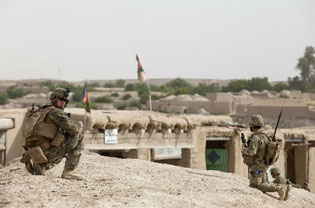Civil Georgia
A U.S. Marine (left) and a Georgian army soldier from the 42nd infantry battalion (right) conduct patrol outside forward operating base Shir Ghazay, Helmand province, Afghanistan, May 10, 2013. Three days after this photo was taken, a truck bomb attack on base in Shir Ghazay killed three Georgian soldiers; a similar attack on other base in Helmand killed seven Georgian soldiers on June 6, 2013. U.S. Marine Corps photo by Cpl. Alejandro Pena via DVIDS
Seven Georgian servicemen were killed and nine wounded after a truck bomb hit one of the forward operating bases in the Helmand province of Afghanistan on June 6, less than a month after three Georgian soldiers died in a similar incident in Helmand.
At the time when the Georgian Ministry of Defense (MoD) first made the announcement late on Thursday about the attack, six soldiers were confirmed dead and MoD said that rescue operation was underway to recover one serviceman from rubble left by the powerful explosion.
But shortly before the midnight on Thursday the MoD said that the soldier was found dead in rubble, increasing death toll from the June 6 attack to seven.
Injuries of nine soldiers are not life threatening, said Irakli Dzneladze, chief of the joint staff of the Georgian armed forces.
He said that the attack was carried out by "a suicide bomber" with an explosives-laden truck.
For the Georgian troops this attack brought the largest death toll in any single incident since joining ISAF mission in November, 2009.
This recent attack brings total death toll of the Georgian soldiers in ISAF mission to 29.
Three Georgian troops died in a similar incident on May 13, 2013 when an explosives-laden truck hit their outpost in the Helmand province.
25-year-old corporal Teimuraz Ortavidze; corporal Giorgi Adamov, 23; private first class Zurab Gurgenashvili, 32; private Mikheil Narindoshvili, 26; corporal Boris Tsugoshvili, 29; private first class Zviad Sulkhanishvili, 22, and private first class Giorgi Guchashvili, 21, (the latter's dead body was found in rubble) died in the June 6 attack.
All were from from the 42nd light infantry battalion of the fourth brigade, which was deployed in the Helmand province in April, 2013. Total of ten soldiers from this battalion have died since deployment in Afghanistan in April.
President Saakashvili expressed condolences over death of the Georgian soldiers in a live televised address. He declared June 7 the national day of mourning.
"Georgia made yet another sacrifice on its difficult path to freedom, independence and joining the family of world's civilized nations," Saakashvili said. "It is our obligation before the memory of our fallen soldiers not to give up, not to step back and to continue moving towards the Euro-Atlantic space, to continue daily struggle for Georgia's independence."
PM Ivanishvili released a written statement expressing condolences over "appalling tragedy that hit Georgia."
Chief of the Georgian army staff, Irakli Dzneladze, said that despite of this recent attack "the Georgian soldiers, who are protecting security of our country in this international mission, will not step back."
Georgia became the largest non-NATO troop contributor to ISAF mission after it almost doubled its presence in Afghanistan to over 1,560 soldiers last autumn.
Georgia has two battalions in the Helmand province and up to 50 soldiers in Kabul.
Georgia’s first contribution to the Afghan operation came in 2004 when 50 soldiers were briefly deployed in the country under the German command as part of ensuring security during the presidential elections.
In November, 2009 Georgia deployed 173 soldiers in Kabul under the French command and in following year Georgia increased presence in Afghanistan by sending an infantry battalion in the Helmand province serving along with the U.S. marines and Georgia sent one more battalion to the Helmand province in autumn, 2012. Currently 50 Georgian soldiers remain in the Afghan capital Kabul; they were initially under the French command, but as France gradually withdraws its troops from Afghanistan, Georgian troops in Kabul were placed this month under the U.S. command and redeployed at the Camp Phoenix - the base in Kabul which is used primarily by the U.S. forces involved in the training of the Afghan army.
News
December 13, 2023
Ethnic minorities outside the peace dialogue
November 6, 2023
‘Peace’ agenda of political parties
Popular
Articles
February 13, 2024




